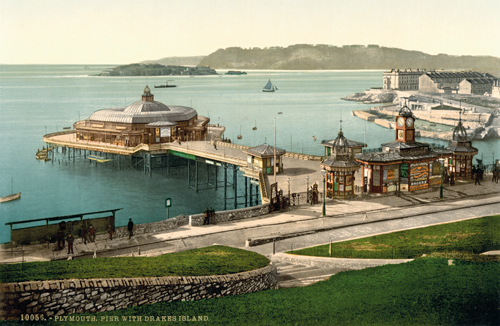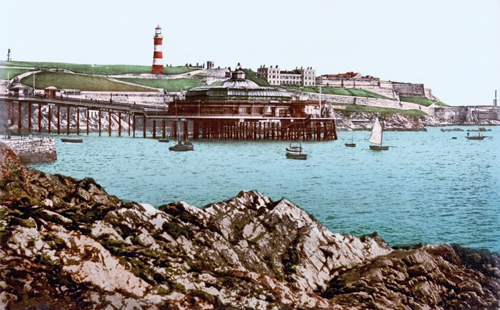Plymouth (24 page)
Authors: Laura Quigley

Grenville proved more sadistic and corrupt than even the Plymouth leaders could have imagined. Grenville became a war profiteer, kidnapping rich men in Devon and holding them in the horrors of Lydford Gaol until their families paid a large ransom; he thereby amassed a personal fortune in land and money. One story is particularly famous: while travelling between Plympton and Tavistock, Grenville and his party came upon four Plymouth soldiers gathering wood. Rather than take them prisoner, Grenville forced one of the Plymouth soldiers to hang each of his company from the nearest tree. Grenville then hanged the last man himself.
![]()
Throughout the English Civil War, the gaol on St Nicholas’ Island (now called Drake’s Island) was used to imprison Royalist dissenters and traitors. After the Restoration, it was the turn of the anti-Royalists and non-conformers to be imprisoned there.
One such was Abraham Cheare, who was a pastor of Plymouth’s Nonconformist Church and a victim of the religious intolerance that hounded Plymouth’s inhabitants. In 1661, he was sent first to Exeter Gaol, charged with encouraging religious assemblies; he was then released in 1662, just as King Charles II removed 2,000 religious dissidents from their parishes (including the preacher for St Andrew’s church in Plymouth). Cheare was imprisoned again in Exeter for holding unlawful assemblies. The conditions in Exeter Gaol were appalling and he spent many hours writing to his congregation telling them how he was relying on his faith to survive. His sister finally secured his release in 1665, but his return to Plymouth brought him back into the hands of his enemies, and he was held in the noxious prison near the Guildhall for a month before being banished to St Nicholas’ Island, where he soon fell ill and died, aged just forty.
![]()

Drake’s Island in 1900, with the pier in the foreground. Prisoners were held on the island during the civil war. (LC-DIG-ppmsc-08786)
By January 1645, Grenville had had enough of fighting skirmishes with Plymouth’s forces and launched a full-scale attack – with over 6,000 of the King’s men – against the central forts along the line. But the weather saved the city. The weather in Plymouth is notoriously wet in the winter months, and in January 1645 it didn’t just rain – it rained for two days, a torrent that filled the ditches with water and made earthworks into mud. Again and again, Grenville sent in his forces to take the earthworks at all costs, only for his men and their horses to drown, sucked into the mud. When one of Grenville’s own officers protested at the useless loss of life, Grenville ran him through with his sword.

Hundreds of years later, the defenses can still be seen. (LC-DIG-ppmsc-08785)
Royalist cannon thundered through the night and at last Grenville’s forces managed to take two of the forts along Plymouth’s line of defences. However, Plymouth’s soldiers battled on and killed sixty of Grenville’s men at Maudlyn Fort, turning Grenville’s own cannon against the oncoming Royalists.
At the fort of Little Pennycomequick, Grenville’s men launched a trap: they somehow managed to take the fort, silently slaughtering every man inside. Then, quietly, they lay in wait, poised for their moment to take the town. But a Plymouth officer called Birch, approaching Little Pennycomequick, realised that the stillness inside the fort was not a good sign. He calmly approached the structure and someone within cried, ‘Stand, who are you for?’ Birch replied, ‘for the Parliament’ – and the rain of gunfire that responded told Birch the fort was taken. He instructed his soldiers to wait for Grenville’s men to run out of ammunition. Then, while they were reloading, Birch and his men charged the fort. Hand-to-hand combat left the fort’s walls and floor soaked in blood – and Plymouth victorious yet again.
Books
Atkinson, C. T. (compiled by),
The Devonshire Regiment 1914-1918
, The Devonshire Press, 1926
Baring-Gould, S.,
Devonshire Characters and Strange Events
, J. Lane, The Bodley Head, London, 1908
Bracken, C. W.,
A History of Plymouth
, S R Publishers Ltd, 1931
Bray, Mrs A. E.,
Traditions, legends, superstitions, and sketches of Devonshire on the borders of the Tamar and the Tavy
, J. Murray, London, 1838
Colwill, R. A.,
Through Hell to Victory: From Passchendaele to Mons with the 2nd Devons in 1918
, self-published, 1927
Dacre, M.,
Devonshire Folk Tales
, The History Press, 2010
Desmond, A. and Moore, J.,
Darwin’s Sacred Cause
, Penguin, 2009.
Eliot-Drake, Lady,
The Family and Heirs of Sir Francis Drake,
Volume 1, Smith Elder and Co, 1911
Ellms, C.,
The Pirates Own Book
, Dover Publications, 1993, re-edited reprint of 1837 original
Fizzard, A. D.,
Plympton Priory: A House of Augustinian Canons in South West England in the late Middle Ages
, Koninklijke Brille NV, Leiden, 2007
Fox, E. T.,
Pirates of the West Country
, Tempus Publishing, 2007
Gaunt, P.,
The Cromwell Gazetteer,
Alan Sutton Publishing, 1987
Gill, C.,
The Naval Mutinies of 1797,
Manchester University Press, 1913
Gill, C.,
Plymouth: A New History
, Devon Books, 1993
Sutton Harbour
, Devon Books, 1997
Goodall, F.,
Lost Plymouth
, Birlinn Limited, 2009
Gray, P.,
Graverobbers and Body-snatchers in Devon
, Halsgrave House, 2009
Gray, T.,
The Devon Almanac
, Mint Press, 2000
Greeves, Dr T., ‘Lydford Castle and Its Prison’ in
Dartmoor Magazine
, 79, Summer 2005, pp. 8-10
Grenfell Price, A., (ed)
The Explorations of Captain James Cook in the Pacific
, Dover Publications, 1971.
Harley, P.,
The Royal Citadel: Home of the 29 Commando Regiment Royal Artillery
Hart-Davis, A., and Troscianko, E.,
Henry Winstanley and the Eddystone Lighthouse
, Sutton Publishing, 2002
Hawkes, J.,
Mount Batten Headland: History and Archaeology
, Plymouth City Museum and Art Gallery, 1998
Hesketh, R.,
Devon Smugglers,
Bossiney Books, 2007
Hesketh, R.,
Plymouth, A Shortish Guide
, Bossiney Books, 2010
Higham, R. (ed),
Security and Defence in South West England before 1800,
Department of History and Archaeology, University of Exeter, 1987
Hippisley Coxe, A. D.,
Haunted Britain,
Hutchinson of London, 1973
Holgate, M.,
Murder and Crime: Devon
, Tempus Publishing, 2007
Devon Villains, Rogues, Rascals and Reprobates
, The History Press, 2010
Hynes, K.,
Haunted Plymouth
, The History Press, 2010
Keble Chatterton, E.,
King’s Cutters and Smugglers 1700-1855
, George Allen and Company, 1912
Mildren, J.,
Castles of Devon,
Bossney Books, Cornwall, 1987
Miller, A. C, ‘The Impact of the Civil War on Devon and the Decline of the Royalist Cause in the West of England 1644-5’ in
Transactions of the Devonshire Association,
Volume 104, 1972
‘The Puritan Minister John Syms’ in
Devon and Cornwall Notes and Queries
, Volume 33.5, 1975
Sir Richard Grenville of the Civil War
, Phillimore and Co, 1979.
Mode, P. G.,
The Influence of the Black Death on the English Monasteries,
a dissertation to the Faculty of the Graduate Divinity School, University of Chicago, 1911
Noble, S.,
Plymouth’s Barbican and Castle
, Plymouth City Council, 2000
Ollier, E.,
Cassell’s History of the United States
, Cassell, Peter and Galpin, 1874
Peirce, R.,
Pirates of Devon and Cornwall,
Shark Cornwall, 2010
Philbrick, N.,
Mayflower
, Penguin, 2006
Photiou, P.,
Plymouth’s Forgotten War – The Great Rebellion 1642-1646
, Arthur Stockwell, 2005
Platt, R.,
Smuggling in the British Isles
, The History Press, 2011
Powicke, M., ‘The Thirteenth Century: 1216-1307’ from Clark, George (ed)
The Oxford History of England
, Second Edition, 1962
Quigley, L.,
The Devil Comes to Dartmoor
, The History Press, 2011
Rule, J. and Wells, R.,
Crime, Protest and Popular Politics in Southern England 1740-1850,
The Hambledon Press, 1997
Skinner, J.,
Did you know: Plymouth, a Miscellany
, Oakridge, 2010
Snetzler, M. F.,
Devon Extracts, The London Gazette 1665-1850
, Volume 2: Plymouth 1665-1765, Devon Family History Society, 1989
Spence, J.,
Nelson’s Avenger,
Bretonside Copy, 2005
The Smugglers of Cawsand Bay
, Bretonside Copy, Plymouth, 2007
Tait, D.,
Mount Edgcumbe,
Driftwood Coast Publishing, 2009
Treece, M.,
No More The Sword
, William Sessions Limited, 2002
Van Der Kiste, J.,
A Grim Almanac of Devon,
The History Press, 2008
Plymouth History and Guide
, The History Press, 2009
Plymouth Book of Days
, The History Press, 2011
More Devon Murders
, The History Press, 2011
Wasley, G.,
Blitz: An Account of Hitler’s Aerial War Over Plymouth in March 1941 and the Events That Followed
, Devon Books, 1991
Watson, J. Y.,
The Tendring Hundred in the Olden Time: A Series of Sketches,
1877, reprinted by Kessinger Publishing in 2008
Waugh, M.,
Smuggling in Devon and Cornwall 1700-1850
, Countryside Books, 1991
White, P.,
Classic Devon Ghost Stories,
Tor Mark Press, 1996
Whitfield, H. F.,
Plymouth and Devonport in Times of War and Peace
, E. Chapple, 1900